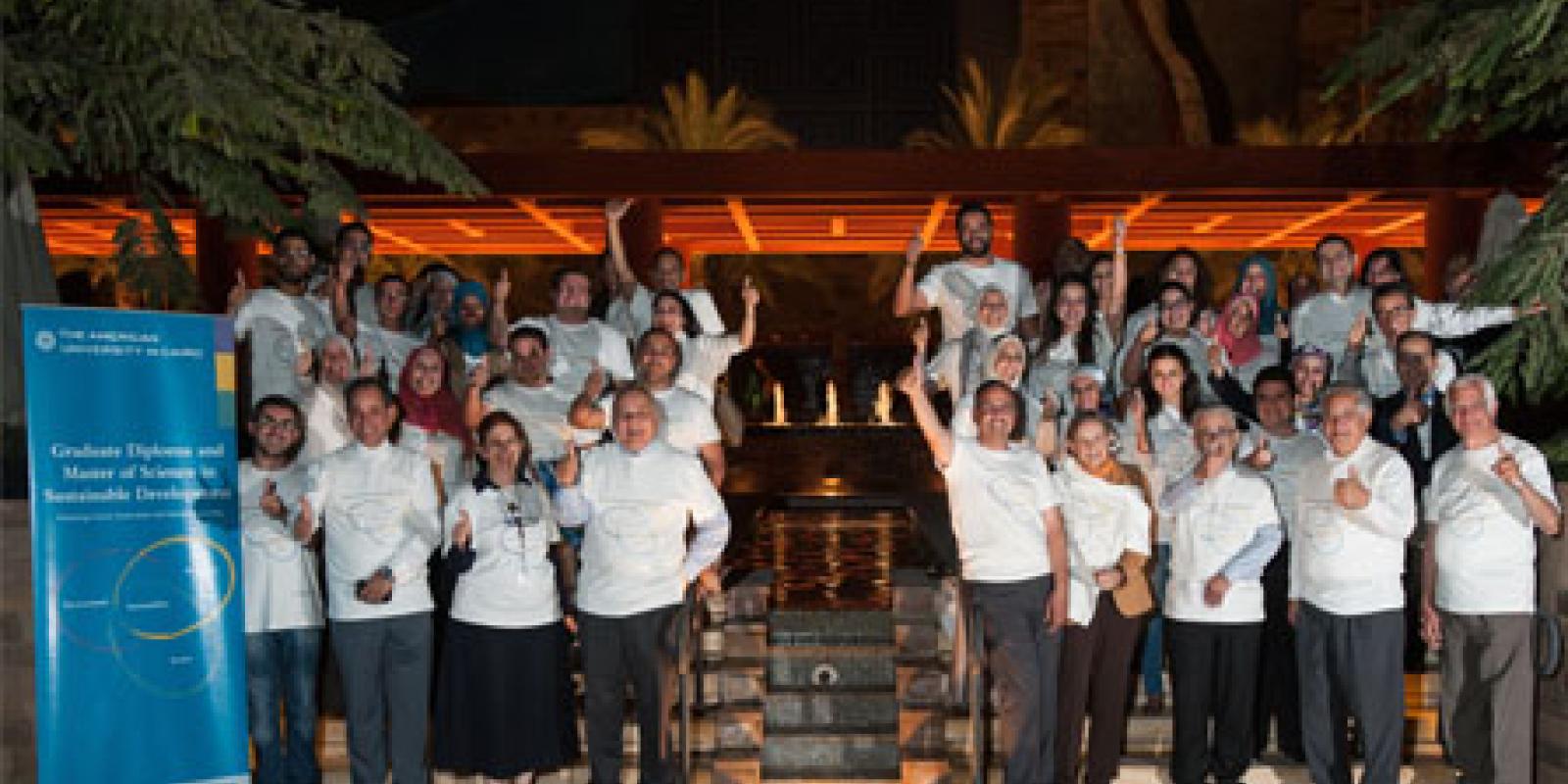
Sustainable Development Graduate Program Provides New Perspectives
AUC recently launched a graduate program in sustainable development, which welcomed 24 new students. President Lisa Anderson, Provost Amr Shaarawi and deans and faculty members from all participating schools celebrated the launch in an event where students emphasized the importance of the program, which is the first-of-its-kind in the region and one of few in the world.
“What I love the most about this unique program is [its emphasis on] youth empowerment,” said graduate student Riham Kabbani. “It is about marking your own footprint, the green one. It is about leaving a legacy of hope to reach for others and to evolve together.”
Sharing the same viewpoint, graduate student Aly Kheireldin noted, “Today, if you are short of wheat or oil, you can buy them, but in a decade or two, there might not be wheat or oil out there to buy. As a country, what is our plan? Or should I ask: Do we have a plan? That’s why I joined AUC’s sustainable development graduate program.”
The program, which offers a Master and graduate diploma in sustainable development, hopes to tackle issues such as resource management, renewable energy, green buildings, waste management and green entrepreneurship in a forward-thinking way. “After an extensive search for a program that could offer a unique, rigorous content that meets my passion for business, community development and harmony between humans and nature, only AUC’s program met my aspirations,” said graduate student Ahmed Abbas. “After one semester, I'm very satisfied, and I feel I have picked the right program.”
The graduate program is noted for its distinctive interdisciplinary approach to sustainability, through which students take courses based in the School of Sciences and Engineering (SSE), School of Business, School of the Humanities and Social Sciences (HUSS) and School of Global Affairs and Public Policy (GAPP). All students study a core module that includes courses from each of the four schools. They then choose a discipline-based module to concentrate on, but have to take courses from at least two other disciplines. The concentration modules include green technologies, offered by SSE; entrepreneurship, offered by the School of Business; sustainable cities, offered by GAPP; and sustainable communities, offered by HUSS.
“I am fascinated with the idea of the new sustainable development program and its interdisciplinary structure, which is one-of-a-kind,” said first year student Rania Hamza. “The unique nature of the program offers me the opportunity to work directly on developmental projects targeting the environmental problems in Egypt, with an emphasis on the holistic approach that incorporates sociocultural and political aspects, which are rarely emphasized in purely environmental science studies.”
Beyond its interdisciplinary approach, the curriculum throughout the program has been designed to focus on learning through projects and community-based activities. “We want students to be prepared for the variety of challenges they will face in the field,” said Hani Sewilam, professor of sustainable development and water resource management, and director of the Center for Sustainable Development at AUC, which coordinates the graduate program. “We want bridge builders, people from different backgrounds who will be prepared to see and understand the interrelations between different disciplines and be able to coordinate teams from different backgrounds to solve community problems in a sustainable way.”
Students are already thinking of ways they will apply the skills learned through the sustainable development graduate program. “Upon completion of the sustainable development graduate program I will start a social enterprise that meets a community need while retaining economic benefits for both the owner and community,” Abbas said.
Sewalim hopes students who complete the program can help meet the needs of Egypt and its neighbors. “The starting point for developing the master’s in sustainable development was the dire need in Egypt and the region for better management of growth,” he said. “In Egypt, development causes a lot of problems. Increased water, air and soil pollution cause health issues and endanger our resources, as does careless disposal of wastewater and trash. However, these issues also provide opportunities for people with the right skills and expertise to develop as green entrepreneurs.”
To apply to the graduate program in sustainable development, click here.
